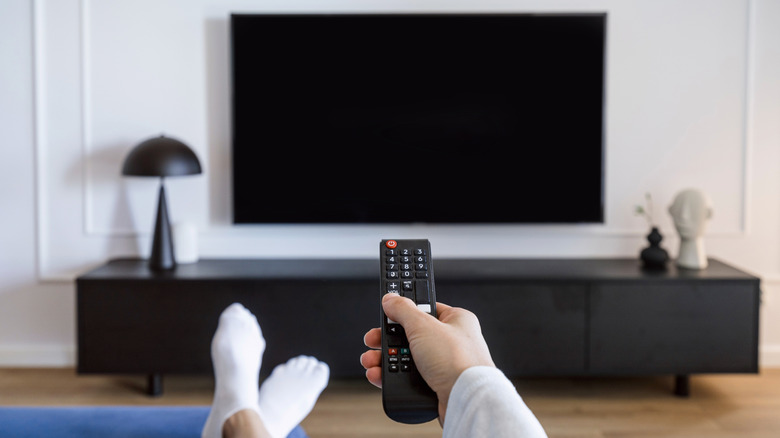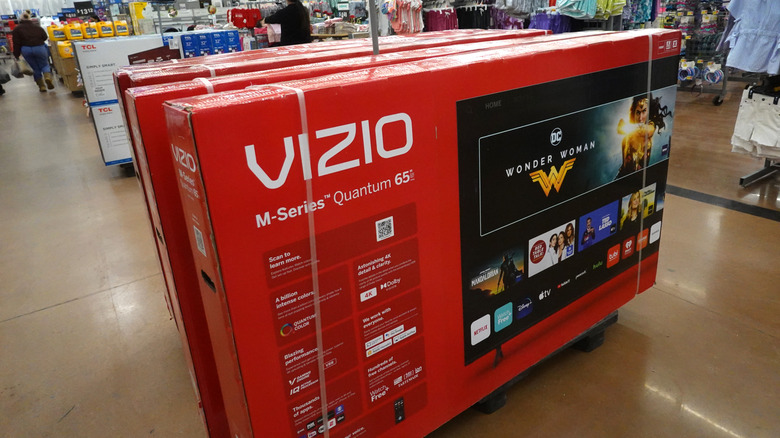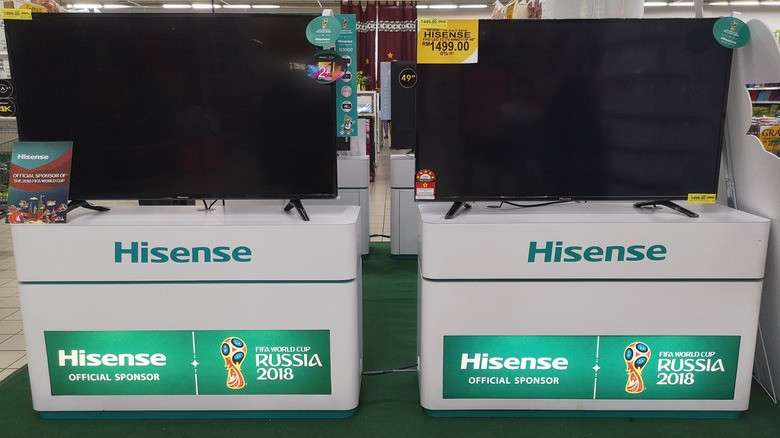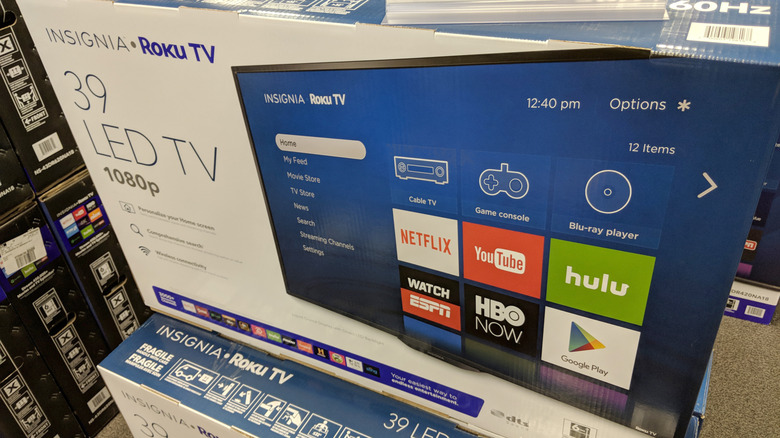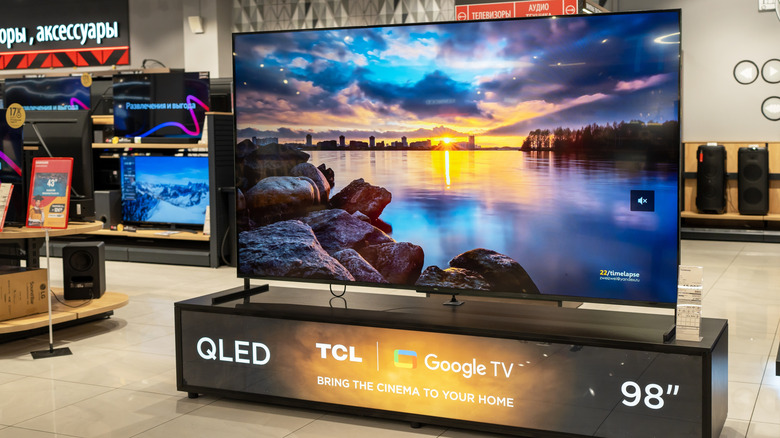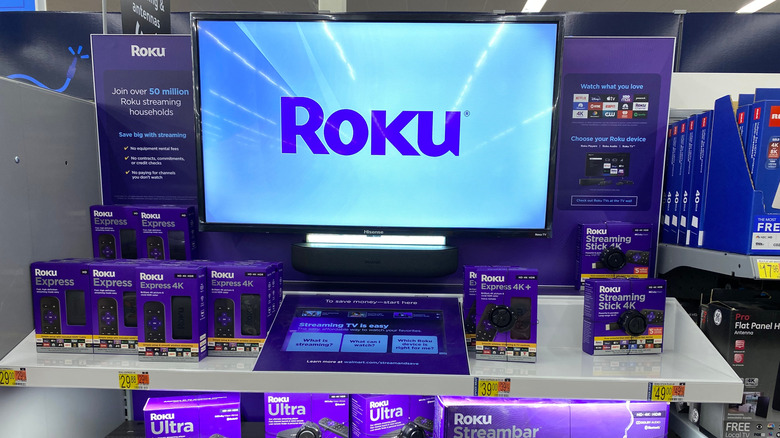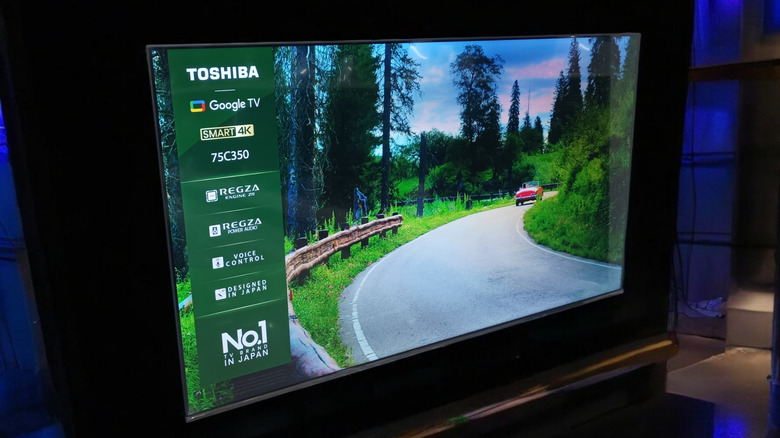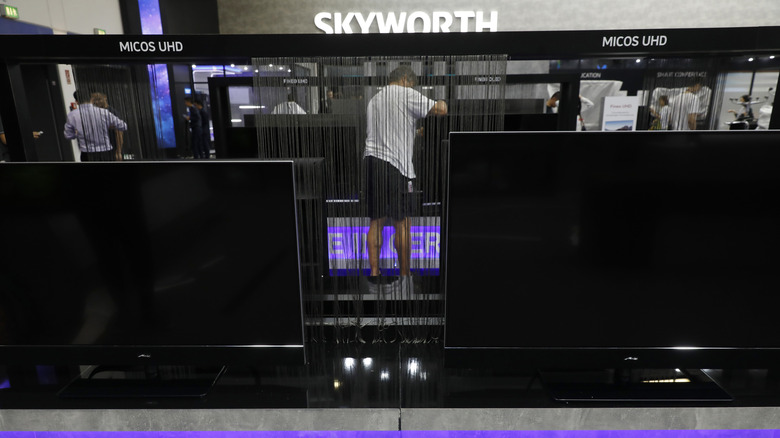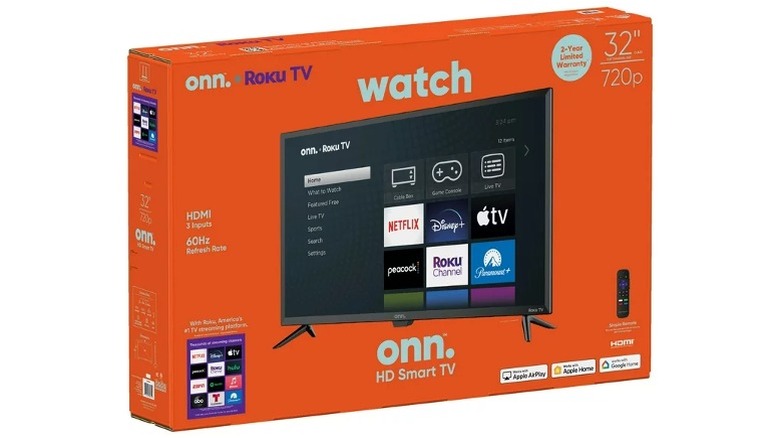The Real Owners Behind The Biggest Budget TV Brands
We may receive a commission on purchases made from links.
While more and more people consume content on their phones, televisions still play a major role in our entertainment. If you want the very best experience when watching movies or playing games, many advanced televisions available in 2024 come with a raft of impressive features and amazing picture quality. But these types of products can set you back thousands of dollars — not money that everyone can afford to spend.
Thankfully, cheaper options can still provide a good viewing experience without breaking the bank, even though they may not have all the bells and whistles of top of the line models. However, these budget brands often have strange names that don't really mean anything and it is rarely clear from store pages who actually owns them or who makes the televisions.That's where we come in.
We've looked into some of the biggest budget TV brands and dug into their ownership to see who exactly is behind the companies — with some surprising results.
Vizio
Vizio is actually one of the oldest budget television brands around. First coming to market in 2002, it arrived at a time when TV sets were moving from bulky CRTs to flat screen high definition models. If you are wondering who makes Vizio televisions, the answer might actually surprise you. That's because the brand doesn't actually manufacture its own products. Utilizing a model made famous by Apple, it outsources this process to other companies — in 2012, this included four manufacturers. Vizio also had a particularly close relationship with Foxconn — the same company that puts together the iPhone.
Foxconn and some of its affiliates were backers of Vizio, having previously purchased stock. As a public company, investment groups such as Vanguard and BlackRock have significant stock holdings of Vizio, as does Taiwanese group AmTran Technology. In 2024, Walmart agreed to buy Vizio in a deal worth $2.3 billion. According to reports, the retail giant hopes to take advantage of Vizio's SmartCast Operating System's 18 million accounts as a way of increasing targeted advertising. Vizio currently makes more from advertising than it does from selling televisions. Currently, the sale is pending but there are no major obstacles expected for the sale to complete in the future.
Hisense
Among the many budget television brands available to buy on Amazon, Hisense is consistently among the most popular and well reviewed. A wide array of models have hundreds of reviews with average ratings of 4.2 or more. There are a lot of things to like about Hisense TVs, along with some bad points, but that's true of every major electronics brand. Most of the company's televisions offer great value for money when compared to established brands such as LG and Samsung, and include excellent features like Dolby Atmos. They are also a good option for gamers thanks to support for standards like HDMI 2.1 and HDR.
Since starting life in 1988, Hisense has operated as a brand of televisions and other electronic equipment alongside an OEM producing products for other companies. It has grown to become the second largest producer of televisions in the world. As a Chinese corporation, there isn't as much information available about its ownership. However, it is known that Qingdao Hisense Electric Holdings Co. is a major owner and Hisense is also partly state-owned, receiving financial backing from the Chinese government. HSBC and the Canada Pension Plan Investment Board are also known to have held shares in 2016.
Insignia
Insignia doesn't exactly rank highly among major television brands. Although the company often nails the basics, there are better options available to those on a small budget. Hisense and TCL are good examples of brands producing similar products with generally better picture quality and features. This hasn't stopped customers from buying Insignia televisions in the thousands, though, largely due to the rock bottom prices they are available at. A 50-inch 4K model can cost as little as $220.
The Insignia brand is actually owned by Best Buy, the U.S. electronics retailer. First made available in 2002, the Insignia name is on a wide array of electronics and devices but is most closely associated with televisions. Best Buy does not manufacture the TVs itself and instead relies on a variety of OEMs to put together the sets. Some of these manufacturers include Hisense and TCL, as well as Foxconn, who assemble the televisions following a collaborative design process with Best Buy, freeing up the retailer to focus on selling and marketing the products.
TCL
TCL Technology is a Chinese company that produces a range of consumer electronics and appliances, including everything from smartphones to washing machines. However, the company has a particular focus on televisions, growing significantly in recent years to become one of the largest TVn manufacturers in the world.
While the brand is undoubtedly known for its budget prices, that doesn't mean that the products are inferior. There is plenty to like about the TCL 6-series once you get to know it, including great picture quality and a useful game mode. Meanwhile, there's a decent selection of TCL televisions that have reviewed well in every category. Likewise, the TCL 40-Inch Class S3 has thousands of positive customer ratings.
The nature of TCL as a Chinese company muddies the ownership structure, similar to other entries on this list. The company was founded by Dong Sheng Li in 1981 and he remains on the board as chairman. Initially the company was backed by the local government in Huizhou and now it state-owned as a subsidiary of the TCL Holdings company, with Chinese authorities supplying billions of dollars in funding to help it maintain lower prices and research new technologies.
Roku
Roku is something of a novelty in the world of televisions. The company rose to prominence by releasing streaming devices that connected televisions to the internet. First debuting in 2008, these products allowed users to add smart features to traditional televisions by allowing users to stream content from services like Netflix. Roku later developed an operating system for televisions and launched the company's first branded television in 2014 under the name Roku TV. This expanded Roku's user base and gave it the opportunity to install its streaming-based operating system on more hardware, although it relies on third-party OEMs such as Hisense and TCL to manufacture the televisions.
Roku OS is largely comparable to Google TV and other in-built operating systems, and some Roku TVs are highly rated — including the 43-Inch Select Series 4K HDR Roku Smart TV.
The company has a good reputation and thanks to its U.S. roots, Roku's ownership structure is far more transparent than other budget television brands. Netflix backed Roku early in the company's history, taking a 15% share of equity. Netflix later sold the shares to Menlo Ventures and Roku eventually went public in 2014 with an IPO, and ownership is now split between investment groups like FMR, Vanguard, and Blackrock.
Toshiba
Although some budget TV brands are relatively recent players in the consumer electronics market, Toshiba has been around for more than 100 years. Over the course of its history, the company has produced and sold everything from computers and printers to air conditioning units and Blu-ray players. For a long time, Toshiba has also been a leader in television sets. The company had, at one point, around a 5% share in the global shipping market for LCD televisions. When it comes to budget models, it is on a very similar level to brands like TCL and Insignia, although its mid-range TVs are generally very competitively priced.
Toshiba was once one of Japan's most respected companies, but has faced several controversies in recent years. This culminated in the brand being delisted from the Tokyo stock exchange in 2023, ending a 74-year streak of being a publicly owned company. The company is now owned by a consortium of firms led by Japanese Industrial Partners as part of a $14 billion deal. However, Toshiba no longer controls the Toshiba brand when it comes to televisions. Hisense forged an agreement that saw it purchase a 95% stake in Toshiba Visual Solutions, effectively taking over the television business completely.
Skyworth
Founded in 1988, Skyworth is a Chinese electronics company that makes a variety of products, including mobile phones, set-top boxes, and televisions. The brand has actually become one of the most well known budget TV makers in the market, offering a selection of ultra cheap products. Many of them, such as the 32 inch Smart TV and the 24-inch P100 Companion Series, are among the cheapest televisions you can buy on Amazon. Of course, for that price you miss out on some important features, and the majority of Skyworth TVs are 1080p or 720p, which means you'll miss out on the crisp 4K picture resolution available with other brands.
A partnership with Google has seen Skyworth ship millions of televisions featuring Google TV and Chromecast support. Some of the higher end releases have also seen positive reviews and Skyworth is now set to become one of TiVo's collaborators as an OEM for the company's hardware. In terms of ownership, the company is listed on the Hong Kong Stock Exchange. Lin Wei Ping, an executive director for Skyworth, holds a significant number of shares alongside investment groups. The Wong family has a controlling stake and owns more than 50% of all shares.
onn.
While onn. has had success with products like streaming boxes that have reviewed very well, the same can't be said of its televisions. A good example of this is the 50-inch 4K Roku Smart TV, which was criticized for its poor performance and picture quality. Recently, things seem to have improved a little bit, and if you only want to spend a few hundred bucks there are not many better value for money budget friendly television brands available in 2024. Its 24 and 32-inch televisions available for less than $100.
Unlike some other budget television brands, you can't find onn. products at a lot of retailers. You'll only find them shopping at Walmart, as it's the store's own in-house electronics brand. Therefore, onn.'s owners are the same as Walmart's owners. The Walton family has the biggest stake in the retail giant, owning a little under 50% of all shares, with investment groups such as Vanguard and Blackrock also being major investors. Walmart doesn't reveal who actually manufactures its televisions but Element Electronics is believed to be involved.
